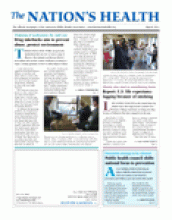Low-literacy food services brochure
The U.S. Department of Agriculture in February published “How to Get Food Help.” The low-literacy guide to food and nutrition services is targeted at consumers who are new to navigating social services and assistance programs. To download the brochure or order free copies, visit www.fns.usda.gov/cga/publications/food_help.htm.
Public health learning products
The Centers for Disease Control and Prevention in February launched “CDC Learning Connection,” a new website that helps users find public health learning products created by CDC and partners. The resource, online at www.cdc.gov/learning, also provides access to Internet-based learning sources, including continuing education credit courses, podcasts, electronic publications and webcasts.
MRSA treatment guidelines
The Infectious Diseases Society of America in January released guidelines for treating methicillin-resistant Staphylococcus aureus, or MRSA. The treatment guidelines, online at www.idsociety.org, can help physicians determine the most appropriate care for the infections caused by the bacteria.
Whooping cough campaign
March of Dimes and Sanofi Pasteur in January launched the “Sounds of Pertussis” campaign. The initiative aims to increase awareness of the dangers pertussis, commonly known as whooping cough, can pose to infants and adults. The campaign, online at www.soundsofpertussis.com, encourages all new parents to get an adult pertussis booster vaccine.
Sleep disorders reference
Omnigraphics’ Health Reference Series in October published “Sleep Disorder Sourcebook, Third Edition.” A consumer-oriented resource on sleep disorders, the book covers sleep disorder basics, the causes and consequences of sleep deprivation as well as health problems that affect sleep. To order a copy, visit www.omnigraphics.com.
Cancer progress report
The American Society of Clinical Oncology in December released “Clinical Cancer Advances 2010.” The annual report on progress against cancer, online at www.cancer.net/cca, covers advances in cancer research that have the most impact on patient care.
Health literacy resource
The Centers for Medicare and Medicaid Services in February debuted a toolkit to help make written material in printed formats easier for people to read, understand and use. The tools, which include guidance on organizing, designing and testing materials with an audience, are available at www.cms.gov/writtenmaterialstoolkit.
Focal dystonia educational website
Merz Pharmaceuticals in February launched a new educational website about focal dystonia, a category of movement disorders characterized by muscle contractions and spasms. The online resource provides patients, family, friends and caregivers information about the condition, treatment options and social media tools to share their experiences. The website also features a patient journal component. For more information visit www.focaldystoniaexchange.com.
- Copyright The Nation’s Health, American Public Health Association









